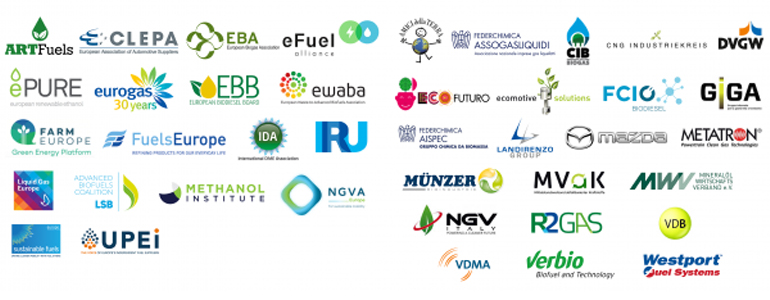A broad group of mobility stakeholders consisting of 39 associations and companies, representing a crucial part of the automotive, fuel, energy industry, and civil society in Europe, have co-signed a letter calling upon the European Commission (EC) to include sustainable renewable fuels in the upcoming EU mobility legislation.

The European Union (EU) has set itself the ambitious objective of becoming climate neutral by 2050 and consequently raised its 2030 climate target. Whether the objective will be achieved and what impact this will have on EU competitiveness and employment strongly depends on the design of a suite of climate policies for the coming years.
Against this ambition, the EU Commission will outline the Sustainable and Smart Mobility Strategy and revise important mobility and energy legislation, such as CO2 emissions standard for cars, vans, and also heavy-duty vehicles (HDVs).
Transport and future mobility will be a central element of these policies. The EU’s long-term climate strategy cannot rely solely on the development of new technologies and infrastructures; it must embrace a diverse portfolio of solutions in parallel, including existing sustainable renewable liquid and gaseous fuel solutions that can reduce greenhouse gases (GHG) starting today.
The signatories of the letter are urging the European Commission (EC) to recognise and include the renewable fuel dimension in the revision of the carbon dioxide (CO2) emissions standard regulation for vehicles to implement a technology and fuel openness towards 2030 and beyond.
At the core of the message, the signatories stress how coupling the efforts for the expansion of the sustainable renewable fuels market with further improvements of vehicle efficiency will enable a competitive and sustainable automotive market until 2050.
At the same time, it will allow Europe to practice the circular economy and seize industrial opportunities while heading towards a carbon-neutral mobility system.
These upcoming revisions are, the signatories say, a timely opportunity to implement a truly technology-neutral approach by including the contribution to emissions reduction achieved using sustainable renewable fuels.
In particular, the letter stresses that it is “paramount” to recognise and include the renewable fuel dimension in the revision of the CO2 emissions standard regulation for vehicles.
Leveraging on the CO2 emissions reduction only at the tailpipe level is not sufficient to ensure the shift to carbon-neutral mobility. Without the contribution of sustainable renewable fuels, the CO2 emissions from the EU fleet will not be reduced fast enough to meet the target in 2030 and towards the net-zero objective in 2050.
The contribution from sustainable renewable fuels recognised in the context of the CO2 fleet target will further support the path towards net-zero mobility, generating additional volumes to the Renewable Energy Directive II (RED II), according to the same sustainability criteria.
The recognition should happen through a new mechanism that encompasses the contribution of sustainable renewable fuels when determining manufacturers’ compliance with their CO2 emission targets.


